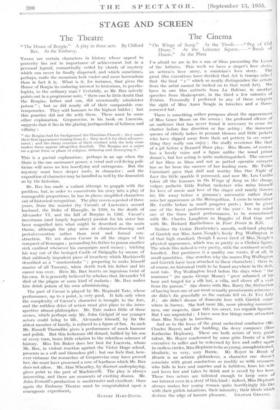STAGE AND SCREEN The Theatre
" The House of Borgia." A play in three acts. By Clifford Bax. At the Embassy.
Timm are certain characters in history whose appeal to posterity lies not in importance of achievement but in a personal legend, romantically veiled by clouds of mystery which can never be finally dispersed, and which sometimes, perhaps, make the mountain look vaster and more horrendous than in fact it is. What is it, for instance, that gives the House of Borgia its enduring interest to historians, to psycho- logists, to the ordinary man ? Certainly, as Mr. Bax naïvely points out in a programme note, " there can be little doubt that the Borgias, father and son, did occasionally administer poison " ; but so did nearly all of their comparable con- temporaries. They sold honours to the highest bidder ; but this practice did not die with them. There must be some other explanation. Gregorovius, in his book on Luerezia, suggests that it lies in the glaring juxtaposition of holiness and villainy : " the Borgias had for background the Christian Church ; they made their first appearance issuing from it • they used it for their advance- ment ; and the sharp contrast of their conduct with the holy state makes them appear altogether fiendish. The Borgias are a satire on a great form or phase of religion, debasing and destroying it."
This is a partial explanation ; perhaps in an age when the State is the one sacrosanct power, a venal and evil-living poli- tician will seem no less horrifying and outrageous. But the mystery must have deeper roots, in character ; and the exposition of character may be handled as well by the dramatist as by the historian.
Mr. Bax has made a valiant attempt to grapple with the problem, but, in order to concentrate his story into a play of manageable proportions, he has in places simplified characters out of historical recognition. The play covers a period of three years, from the murder (by Caesar) of Lucrezia's second husband, the Duke of Bisceglie, in 1500, to the death of Alexander VI. and the fall of Borgias in 1503. Caesar's incestuous (and largely legendary) passion for his sister has been magnified into what might be described as the main theme, although the play aims at character-drawing and period-evocation rather than neat and formal con- struction. We are shown Caesar in all the stages of his conquest of Romagna ; persuading his father to poison another rich cardinal whenever his campaigns need Money ; tricking his way out of the besieged Castle of Sinigaglia by means of that sublimely impudent piece of treachery which Machiavelli described as a " masterstroke " ; preparing to make himself master of all Tuscany, when death took his father and his career was over. Here Mr. Bax inserts an ingenious twist of his own. It is generally believed by scholars that Alexander VI died of the plague or some kind of malaria : Mr. Bax makes him drink poison of his own administering.
The part of Caesar is played by Mr. Reginald Tate, whose performance, up to a point, is very good. It fails only when the complexity of Caesar's character is brought to the fore, and the ruthless drive of action must give place to the, intro- spective almost-philosopher. Mr. Tate makes little of these scenes, which perhaps only Mr. John Gielgud of our younger actors could bring to life. Alexander himself, by far the ablest member of family, is reduced to a figure of fun. As such Mr. Russell Thorndike gives a performance of much humour and polish. But this lecherous old' dotard, bullied by his son at every turn, bears little relation to the relentless schemer of history. Miss Iris Baker does her best for Lucrezia, whom Mr. Bax, in violent reaction against the Victor Hugo school, presents as a soft and blameless girl ; but one feels that, how- ever virtuous the researches of Gregorovius may have proved her, she must have possessed a core of hardness which Mr. Bax does not allow. Mr. Alan Wheatley, by discreet underplaying, gives point to the part of Machiavelli. The play is always interesting, and there are moments of exciting drama. Mr. John Fernald's production is unobtrusive and excellent. Once again the Embassy Theatre must be congratulated upon a courageous experiment.
RUPERT IIART-DAVIS.






































 Previous page
Previous page